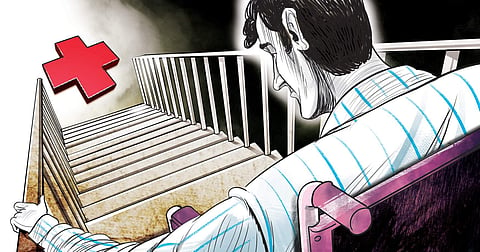

Insurance is the subject of solicitation” declaim the ads for health insurance and they are right. For it is certainly not the subject of solicitude. It is a shocking fact that while insurance companies make billions in profits by insuring the young and healthy, they are not willing to cover some of the most vulnerable and deserving sections of society: to take the two most numerous of them—the physically disabled and HIV/AIDS-afflicted. The regulators—the Insurance Regulatory and Development Authority of India (IRDA) and the Office of the Chief Commissioner for Persons with Disabilities (CCPD)—who are mandated by law to ensure that this discrimination does not happen, appear to be more sympathetic to corporates than to those who need insurance cover.
Article 25 of the UN Convention on the rights of the disabled prohibits discrimination in matters of health and life insurance. The right to health includes the right to medical cover without any discrimination. But this is still a distant dream for India’s 22 million physically disabled persons. Their conventional medical parameters are likely no worse than that of the average person. And yet insurance companies summarily reject their applications, ab initio, without assigning any reason, and often rudely. My son is a quadriplegic and I have come to know many physically disabled persons, not one of whom has been successful in obtaining medical cover. The refusal by these companies is illegal because it runs counter to the IRDAI (Health Insurance) Regulations, 2016:
Regulation 8 (b): “The underwriting policy shall also cover … health insurance coverage not only to standard lives but also to sub-standard lives.”Regulation 8 (c): “A denial of a proposal shall be communicated to the prospect in writing by recording all the reasons for denial. Provided that the denial of the coverage shall be the last resort that an insurer may consider.”
Both rules are being flouted with impunity: the only policy insurance companies have for the unhappily worded “sub-standard lives” is to ignore them totally, and rejecting their cases is the first resort, not the last. There is no evaluation of medical history, review of current condition or transparent assessment of risks, as is required by IRDA. At the first mention of the word “disabled” the proposal is rejected outright.
One could perhaps understand the mercantile bias of insurance companies but what is shocking is the callous attitude of the two regulators. If someone files a representation against an insurance company’s rejection with the CCPD office, the latter does nothing more than act as a post office by forwarding the representation to IRDA, which in turn forwards it to the insurer, whose standard comments are regurgitated back down the line. The end result is more shocking: the IRDA defending the violation of its own rules by endorsing the company’s stand by stating (as in my son’s case), “Insurance products should be financially viable and self sustainable for them to meet the liabilities as and when the claim arises.” This is a red herring for there are no actuarial studies to establish that covering the disabled is “financially unviable”. Nor has IRDA bothered to find out if companies have a reasonable policy for “sub-standard lives” as the regulation requires.
The same commercial callousness is evident in the treatment meted out to HIV/AIDS patients; insurance companies do not provide them health cover on the presumption that their weakened immune systems will expose them to more ailments, and therefore make their policies financially unviable. But there are (as in the case of the disabled) no firm actuarial studies to support this. However, there is now a ray of hope for HIV/AIDS patients: goaded by international pressure and court rulings, the government has promulgated a law to protect their interests. The Human Immunodeficiency Virus and Acquired Immune Deficiency Syndrome (Prevention and Control) Act, 2017, came into effect in September, and Section 3 bars companies from discriminating against them. The IRDA, as usual, belatedly followed up with a vapid circular in October, ruling that these companies cannot deny insurance cover to HIV/AIDS-affected persons unless supported by actuarial studies.
In a landmark verdict on 26 February, the Delhi High Court said “contracts have to be based on empirical testing and data and cannot be simply on the basis of subjective or vague factors.”
The business model for health insurance is to make hefty profits from the healthy and use part of it to cross subsidise (if necessary) the sick. In India, companies are being allowed to get away with disregarding the second part. Even the Ayushman Bharat initiative will be a betrayal of the disabled and HIV/AIDS patients unless this is fixed. The legislative protection provided to HIV/AIDS cases should also be made available to the physically disabled by incorporating similar provisions in the Rights of Persons with Disabilities Act, 2016.
Regulators should be given the powers to impose fines on defaulting insurance companies. IRDA should commission actuarial studies to determine the risks for various classes and categories of the disabled, and fix the range of permissible premiums for each. Most important of all, the IRDA and CCPD office will have to move beyond issuing circulars and show genuine empathy and sensitivity to the plight of these people: they have already been let down by fate, the government should not let them down too.
Avay Shukla
served in the IAS for 35 years and retired as Additional Chief Secretary of Himachal Pradesh
Email: avayshukla@gmail.com